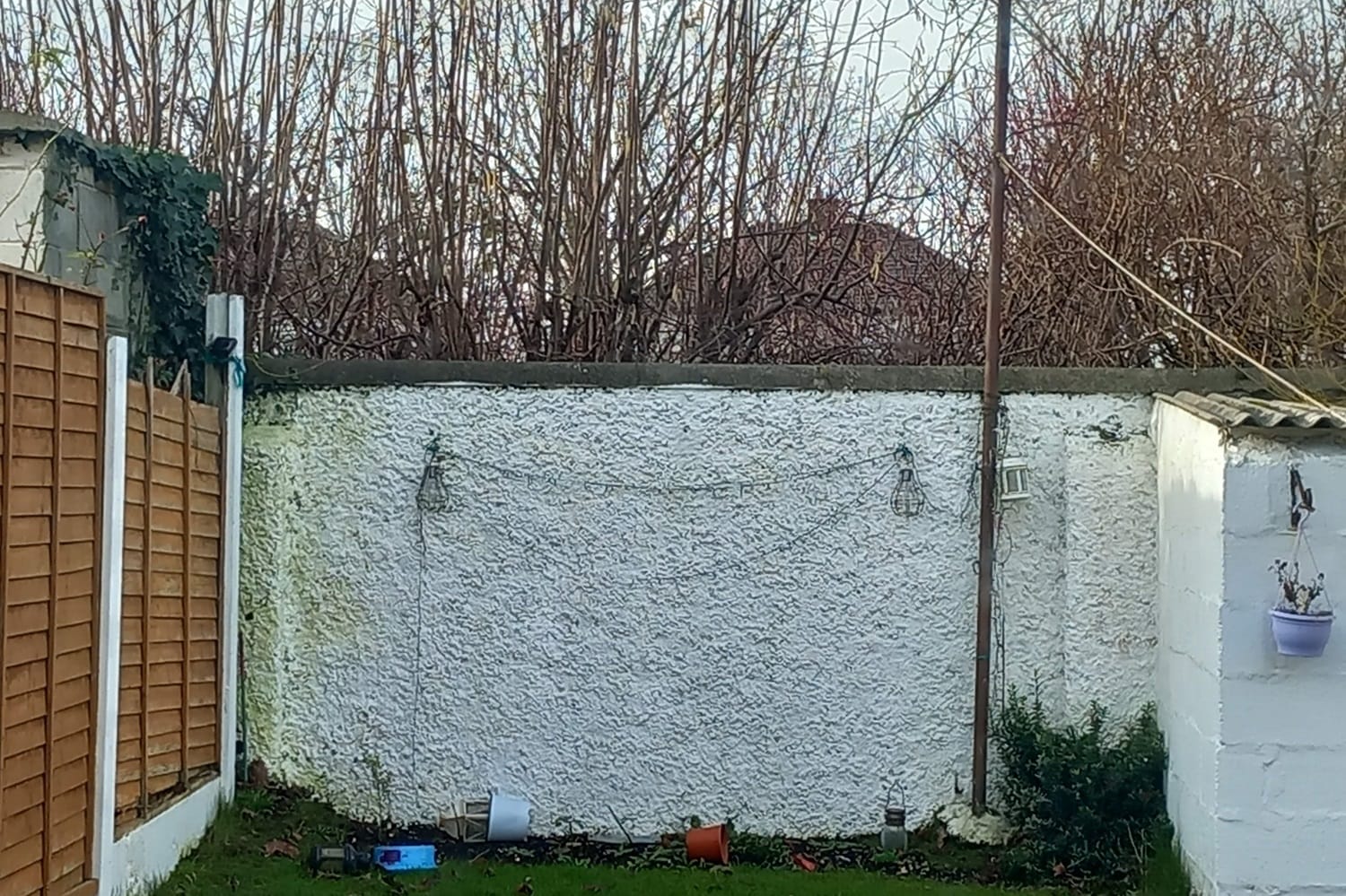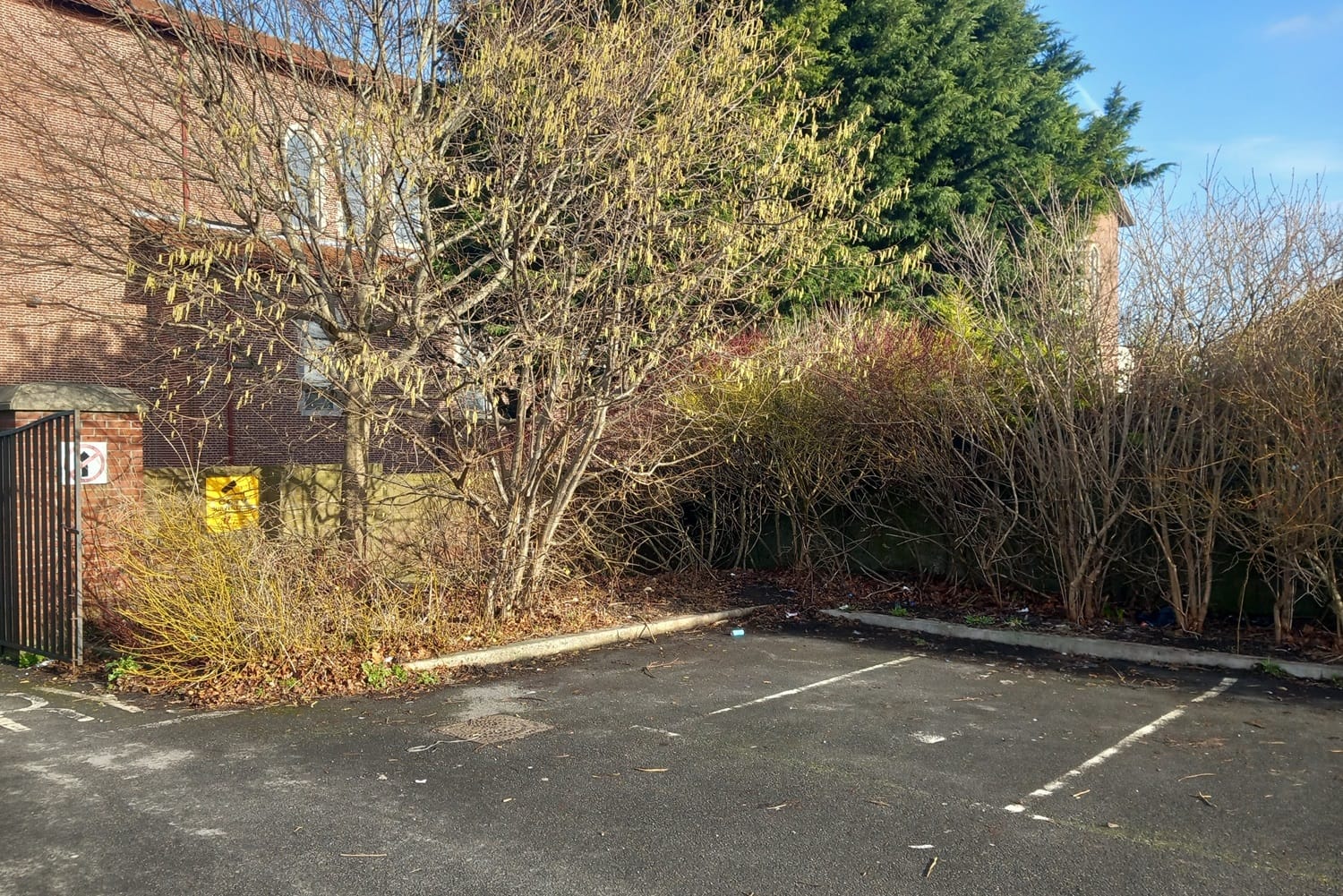What’s the best way to tell area residents about plans for a new asylum shelter nearby?
The government should tell communities directly about plans for new asylum shelters, some activists and politicians say.
Harry Murphy, whose back garden borders the car park, says he wishes the CCTV was still there. “There’s been carpets dumped there – a whole kitchen once.”

There’s been an illegal dumping problem for years at the sprawling surface car park in Whitehall, next to the Church of the Holy Child.
The council has tried a few things to tackle it: clearing shrubs and greenery at the corner of the car park, over by where Collins Avenue meets Swords Road, for example.
And there was CCTV there too. Until residents requested that the council remove it, said council manager Derek Farrell, at a meeting of the local area committee in January.
“The residents I suppose under GDPR [the General Data Protection Regulation] wanted rid of it. So the CCTV was got rid of,” said Farrell, the local area manager for the council, at the 15 January meeting.
Local resident Harry Murphy, whose house fronts onto Thatch Road, his back garden bordering the car park, says he wishes the CCTV were still there.
He says he thinks it’d help with the dumping.“Of course it would, if they would follow up on it,” Murphy said last Thursday, standing in his kitchen. “There’s been carpets dumped there – a whole kitchen once.”
Murphy said he cannot understand why a resident of Thatch Road, where he lives, would object to CCTV at the car park.
Their back gardens are separated by both their back walls, and also a high hedge. The car park isn’t visible from Murphy’s house, and no camera over there would peek into his garden or home.
No other houses border the car park except Murphy’s and the others along Thatch Road.

The council has not provided responses to queries sent 17 January asking when exactly the cameras were removed, who asked for them to be taken out, and whether the council has any way of knowing if they were involved in the dumping.
Says Green Party Councillor Donna Cooney: “I mean, it could be somebody that was a dumper saying it.”
Dublin City Council and other local authorities have struggled for years to reconcile efforts to use CCTV to combat illegal dumping with data privacy laws.
The government brought in a new law in 2022 to help smooth this issue out for them, but they still haven’t put it into practice.
A Dublin City Council official said at a meeting last week that there are still more bureaucratic hurdles to clear before that will be possible.
Social Democrats Councillor Patricia Roe says she lives near the church car park and has been involved for the last couple of years in tackling the illegal dumping issue there.
The car park is large, maybe 280 spaces, free to access, used as – among other things – a park-and-ride for people going into town.
At the north end is the church, which owns the northern third of the car park, Farrell said at the meeting.
The southern two-thirds are owned by the council, which has plans to work with approved housing body Clann to develop housing for older people there.
Underneath it all runs the Dublin Port Tunnel, which complicates the effort to develop housing above ground.
On the council’s end of the parking lot, near Collins Avenue, is a bottle bank. There also used to be bushes down this end, where the car park meets the road. And this is where the CCTV was too, Roe says.
The council’s end of the car park used to be a mess, Roe says, but it has improved. Last Thursday it was well kept, no sign of dumping.
To get to this stage, the greenery was removed, and a clothes bank was taken out. People used to empty it to sort through the contents, take the best bits and leave the rest on the ground, Roe says.
Now the dumping is down the other end, the church’s end, Roe says. The CCTV that was removed at someone’s request “would have no effect on the dumping now”, she says.

What’s needed is CCTV at the church’s end of the car park, Roe says. Farrell said the council had considered installing cameras there.
“We had thought about CCTV – kind of covert CCTV – to try and do something down that end,” he said.
“But the fact that we had to take it from covering the bins where there was a lot of dumping happening means that there’s no point in even looking at that,” he said.
At the 15 January meeting, Farrell, the council manager, said there was a lot of rubbish on the church end of the car park at that time.
The church had indicated that they didn’t have the staff to clean it up, Farrell said. So the council was planning to do it for them, and not for the first time.
“I think it was probably six, eight months ago they spent six or seven thousand [euro] to clear rubbish out of it,” he said.
Farrell said it was “unfortunate” that there was no longer CCTV at the car park, and also that Thatch Road residents objected to a proposal to clear the hedge between their back garden walls and the car park – under which a lot of rubbish is dumped.
Fianna Fáil Councillor Racheal Batten said “it’s just ridiculous, it’s absolutely atrocious at the moment”.
By last Thursday, the council must already have organised the clean-up of the rubbish at the church end of the car park, as it was quite clean. Just a few empty cans and crisp bags in the greenery here and there.
On a low wall separating the car park from the church grounds, there’s a yellow sign that says “CCTV surveillance”.
Beyond that, across a small road or driveway, up high on the red-brick of the church’s exterior wall, two cameras are visible – though trees would seem to block their view of the car park.
“It is my understanding that the parish has never had CCTV at the car park nor has it ever requested the removal of a CCTV system,” a spokesperson for the Catholic Archdiocese of Dublin.
At the January meeting, Batten, the Fianna Fáil councillor, suggested putting in a barrier separating the council’s bit of the car park from the church’s.
“I appreciate we’re cleaning it, but we are cleaning somebody else’s property,” Batten said.
Farrell, the council’s local area manager, said he’d speak to the council’s property development section, which controls the council’s part of the car park.
But “even if we put barriers up there and something happens, I think it’s going to come back to us anyway”, he said. “Maybe it shouldn’t, but it’s probably going to come back to us to clear anyway.”
In response to a query about whether it should be the church that cleans up its end of the car park, not the council, Vanessa Burke, from the parish office, said the parish priest wasn’t available.
However, “I understand that there is an arrangement with Dublin City Council whereby the jointly-owned carpark is maintained and made available as a public park-and-ride amenity for the time being,” she said by email.
Says Roe, the Social Democrats councillor: “We can’t continue to fund the cleanups that will need to be done on a regular basis.”
The council’s development section controls the southern part of the car park because there’s a plan – still in early stages – to develop housing on it.
Murphy, in his Thatch Road home last Thursday, said he’d heard there was a plan to build a multi-storey housing development for older people on the car park.
But he’d thought once they discovered that the Port Tunnel runs underneath it, they’d abandoned the plan. Not so, it seems.
Roe, the Social Democrats councillor, said the idea had been to build about 100 apartments on the site, and forwarded a link to a conceptual drawing of a complex rising to what appears to be six storeys.
She said there was “Big local opposition to this on account of height”. “Recently we were informed that plans have been changed and number of apartments have dropped to 45 [units] over three stories,” she said by WhatsApp on Tuesday.
A new design is being prepared and is due to be presented to local councillors “shortly”, Roe said.
That development could change the illegal dumping situation. It could be years, though, before anything will be built on the site, even if it proceeds smoothly from here.
Another solution could be the re-installation of CCTV, in a location covering the areas most prone to dumping.
The Circular Economy and Miscellaneous Provisions Act 2022 included sections shoring up local authorities’ ability to use CCTV to tackle illegal dumping.
The Local Government Management Agency (LGMA) has taken that law and produced a “code of practice” telling councils how they can use it to prevent, detect and prosecute litter offences.
Environment Minister Eamon Ryan, a Green Party TD, said last month he had signed off on this code of practice.
So councillors at a meeting last week of Dublin City Council’s climate and environment committee were hopeful that the council could soon roll-out a CCTV scheme to fight illegal dumping at locations around the city.
Not so fast, said council litter prevention officer Bernie Lillis. There are still more steps to take before the new abilities make it through the bureaucracy and into reality, she said at the meeting.
The attorney general has to sign off on the LGMA’s code of practice, then the Waste Enforcement Lead Authority for the Eastern-Midlands Region (a body led by Dublin City Council) needs to issue guidance on producing CCTV schemes.
“Whilst the codes of practice have been agreed and signed off by the minister, all the minister and all the agencies, that has to be written into the legislation, it has to be commissioned and it has to be signed off by the attorney general,” Lillis said.
“After that then we have to do our CCTV scheme,” she said. “Now I have started doing a business plan in order to get the CCTVs in place, but we also then need to go to tender to get a contractor to provide the service and we can’t advertise the tender until the codes have been signed off.”
“So we can’t move just yet to do anything,” she said.
Talking generally about council efforts to deal with litter in the public realm, Green Party Councillor Janet Horner said at the meeting that the issue is urgent.
“It’s at the stage now when people are saying they feel they have to move out of the city in order to raise their children in a sanitary environment,” she said.
“Because the walk between their home and the school which is only down the road involves nappies, sanitary pads, dog fouling,” she said.
Get our latest headlines in one of them, and recommendations for things to do in Dublin in the other.